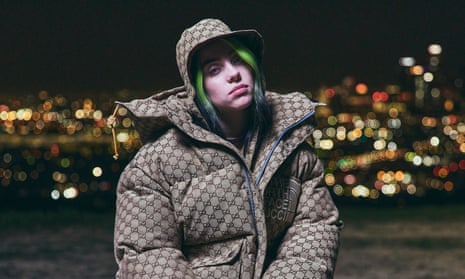In a typical scene from Billie Eilish: The World’s a Little Blurry, the documentary’s pop star subject is in the back yard, surrounded by her family. She is busy filming preliminary scene sketches to show her video team what she wants from her next music video. Eilish’s mum plays the role of Billie, sitting at a precisely angled table and pretending to drink from a glass. “Don’t zoom,” Eilish orders the video team from behind the lens. “Don’t do anything like these bozo fucking film-makers do.” On the actual video shoot, for her song When the Party’s Over, Eilish is the locus of control, making the director seem like her meek deputy. When she leaves the set, she tells her mother and manager that she’s directing the rest of her videos herself.
From the professional (self-flagellating over her live shows) to the personal (mistreatment from a boyfriend), Eilish is shown to take everything in her stride. The film implicitly argues that this autonomy is why she is as famous as she is. It makes for a seductive comparison with Framing Britney Spears, the recent documentary about the millennium pop icon’s struggle for the most basic control over her life. Eilish’s control is likely to be regarded as a tidy conclusion to the Britney era – “Look how things have changed for the better for women in pop” – but it’s arguably the start of a different epoch of fame, one with its own crushing pressures.
The World’s a Little Blurry contrasts Eilish’s early years in the spotlight with those of Justin Bieber. Their journey from 12-year-old fan and adored artist to new superstar and fame-burned mentor is a dynamic and affecting part of the film: Eilish’s mum is moved to tears for the “really sad” Bieber who doesn’t have her daughter’s omnipresent family support system. Katy Perry also pops up to offer Eilish mentorship on the “weird ride” of pop fame, another nod to the lineage of American pop stars seemingly destined to peak and crash.
Otherwise, the film is largely domestic. Eilish’s mother is always checking in on her, often choked up with concern and admiration. Her father, the unsung hero with his hip outfits and quiet wisdom, dotes on her. (He is the obvious antithesis of Jamie Spears, the man behind Britney’s conservatorship.) Eilish’s only immediate antagonist is her loving songwriter-producer brother, Finneas, who says he has to trick her into writing popular songs – songs that she fears writing because with popularity comes hate.
With this emotional buttress – plus heightened public awareness of mental health – Eilish can be candid about the highs and lows of her life in a way that frees her from the expectations of perfection that paved the way for Spears’ and Bieber’s falls from grace. That transparency – the kind that many young stars naturally or deliberately perform on social media – is another way Eilish can maintain control. But it exerts its own cost, forcing her to consider her brand not just in the real world and in the tabloids but online, among her peers, fans and trolls.
“I can’t have one moment where I’m like ‘I don’t wanna do this,’” Eilish tells her team, after someone writes an Instagram comment saying she was rude at her meet-and-greet. “I have to keep smiling and if I don’t, they hate me and think I’m horrible.” Moments before, we saw an exhausted and disoriented Eilish repeatedly being pulled back into an ad-hoc cattle call with industry folks and their kids. Although her mum is quick to acknowledge that they failed her that night, the fact remains: Eilish is chastised – and quickly – for not being perfect. Questions hang in the air: how far will this negativity disseminate and what will the repercussions be?
Eilish’s debut album made her the first artist born in the 21st century to have a US No 1 record. There is no precedent for her as the first digital native pop superstar. Her struggles for control may not be rooted in fighting record industry bogeymen, but in the persistent anxiety and awareness of online abuse and the constant stress over being misconstrued. The World’s a Little Blurry is 150 minutes long: Eilish is caught between not being able to escape documentation and it being the only way she knows how to live and work. In that sense, little has changed. For all Eilish’s stability and self-direction, the unchanged scrutiny of young women means she faces the same broad predicament as Spears.
And control and radical transparency can only do so much. When someone from Eilish’s label queries whether it’s wise for the singer to take a vocal anti-drugs position – in case she experiments when she’s older and gets “dragged” (criticised by fans) – Eilish’s mum pushes back: staying true to who Billie is right now should be enough. Eilish replies: “Well, she’s right though. She has a point.” She knows it’s not enough for young superstars to appear to live authentically in the present. They also have to be working five years ahead, risk-assessing an unknown and potentially hostile future.

